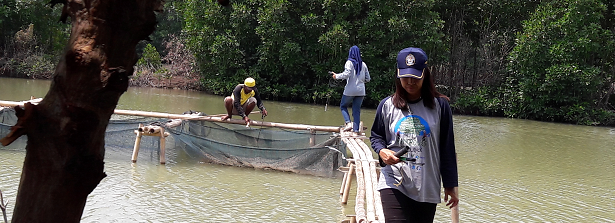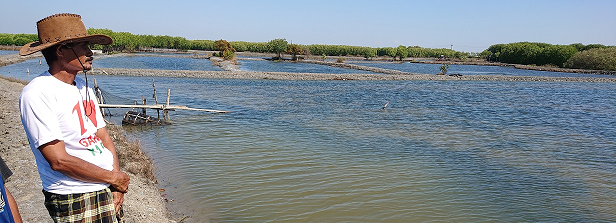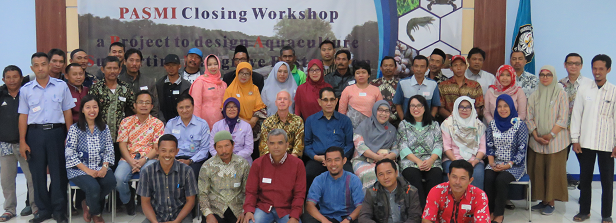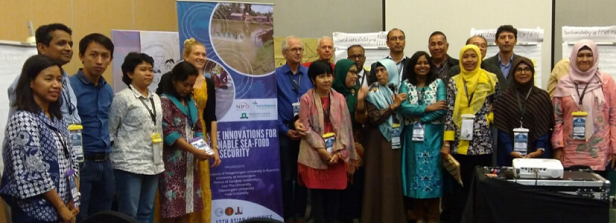Sustainable aquaculture to support mangrove forest restoration in Indonesia (PASMI)

Duration: January 1, 2016 – December 31, 2018
Project information
This research focuses on multi-trophic coastal aquaculture systems, which support the restoration of mangrove forests in Indonesia. In these systems, different organisms, such as shrimp, blue crab and others, are produced in an integrated way, thereby supporting resilient livelihoods while also safeguarding the mangrove functions for coastal protection.
Aim: In many tropical countries, clearance of mangrove ecosystems for coastal development results in decreased seafood from fisheries, abrasion of land, losses of prospering rural livelihoods, and reduced sedimentation required to counteract land subsidence and sea level rise. Current development programs in Indonesia envision a future in which mangroves underpin coastal protection and resilient livelihoods, and both aquaculture and fisheries provide healthy foods for rural and urban populations. Within this frame, the PASMI project aims to enhance sustainable rural-urban food systems by designing, together with the main stakeholders, environmentally friendly alternatives for extensive shrimp culture, which often goes at the expense of mangrove areas. PASMI will specifically support and analyze the introduction of blue swimming crab farming and integrated-multi-trophic-aquaculture (IMTA) of shrimp, fish, seaweed, green mussel and blood cockle in three sites in North Java, Indonesia, which currently suffer from mangrove loss and land subsidence due to urbanization.
Objectives: PASMI’s objective is to contribute to the vision of Demak Regency by assessing the feasibility of developing:
- Integrated multi-trophic shrimp farming systems, using stocked filter ponds and poly culture, in the coastal landscape suffering from salinity intrusions and fresh water shortage due to nearby urban areas.
- New aquaculture species, focusing on blue swimmer crab, to increase options for farmers having become resources poor due to climate impacts and land subsidence in the peri-urban landscape.
Method: Both farmer and researcher led experiments, i.e. on-farm and on-station, will be run and monitored. Farmer led experiments will be designed in the framework of CFS regarding the stocking densities, choice of species in the ponds, technologies used to fertilize the shrimp ponds and to manage water quality. Researcher led experiment will be designed in tanks or small ponds to measure the effect of level of feeding and species composition on aquatic production, while monitoring water quality parameters. Some of the factors to be tested are the complementary presence of tilapia, sea bass and bivalves, and the influx of water from an estuary with mangroves. Next to the involved producers, private traders, government and non-government services providers, the opinion of non-involved stakeholder and consumers will be considered. The latter may be indirectly obtained through data collection at the level of importers and retailers.
Country: Indonesia.
Dutch policy goals: Sustainable food systems; and Urbanization and challenges for food and nutrition security.
Progress reports
Year 1: After the kick-off, instalment of budget and confirmation of staff at the UNDIP, the research protocols were discussed and the experimental facilities completed. Between October 2016 and February 2017, two experiments were done. Low densities of decomposing mangrove leaves of the tested species can have a positive effect on shrimp if the levels of oxygen and ammonia are controlled. The growth of young crab was negatively affected by higher densities. To verify the conditions for aquaculture, the presence of heavy metals in waterways and ponds was assessed. The first stakeholder workshops assessing barriers to innovations in the aquaculture sector were held in Demak; those on Blue Swimmer Crab in Brebes will follow. The on-going monitoring of the related project BwN-Demak’s Coastal-Field-Schools found that one farmer already used seaweed to clean the water in which he cultures shrimp. After complementary experiments PASMI will spread this technology through BwN-Demak’s innovation platforms.



